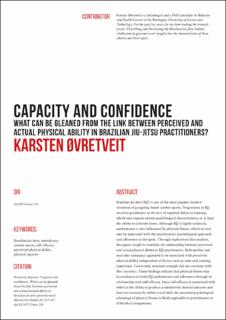| dc.contributor.author | Øvretveit, Karsten | |
| dc.date.accessioned | 2021-01-25T09:27:09Z | |
| dc.date.available | 2021-01-25T09:27:09Z | |
| dc.date.created | 2020-11-20T11:08:19Z | |
| dc.date.issued | 2020 | |
| dc.identifier.issn | 2057-5696 | |
| dc.identifier.uri | https://hdl.handle.net/11250/2724461 | |
| dc.description.abstract | Among the many modern iterations of grappling-based combat sports, Brazilian jiu-jitsu (BJJ) has emerged as one of the most popular. In addition to its well-established effectiveness in competition, it is considered to be recreationally inclusive in the sense that virtually anyone can practice it independent of their baseline physical fitness. Despite its putative versatility, the attrition rate is notoriously high, particularly among inexperienced practitioners. Progression in the sport requires persistence in the face of repeated defeat in training, which may require certain psychological characteristics, or at least the ability to cultivate such characteristics. Although BJJ is highly technical, performance is also influenced by physical fitness. Additionally, fitness may be related to the psychological approach to and involvement in the sport, which is key in a sport that challenges several aspects of one’s self-efficacy, particularly in the early stages of practice. Through exploratory data analysis, this paper sought to elucidate the relationship between perceived and actual physical ability in BJJ practitioners. Both aerobic and muscular endurance appeared to be associated with perceived physical ability independent of factors such as rank and training experience. Conversely, maximal strength did not correlate with this construct. These findings indicate that physical fitness may be conducive to both BJJ performance and adherence through its relationship with self-efficacy. Since self-efficacy is concerned with belief in the ability to produce a subjectively desired outcome and does not necessarily reflect actual skill, the potential psychological advantage of physical fitness is likely applicable to practitioners at all levels of competence. | en_US |
| dc.language.iso | eng | en_US |
| dc.publisher | Cardiff University Press | en_US |
| dc.rights | Attribution-NonCommercial-NoDerivatives 4.0 Internasjonal | * |
| dc.rights.uri | http://creativecommons.org/licenses/by-nc-nd/4.0/deed.no | * |
| dc.title | Capacity and confidence: What can be gleaned from the link between perceived and actual physical ability in Brazilian jiu-jitsu practitioners? | en_US |
| dc.type | Peer reviewed | en_US |
| dc.type | Journal article | en_US |
| dc.description.version | publishedVersion | en_US |
| dc.source.journal | Martial Arts Studies | en_US |
| dc.identifier.doi | http://doi.org/10.18573/mas.110 | |
| dc.identifier.cristin | 1850308 | |
| dc.description.localcode | The journal is licensed under a Creative Commons AttributionNonCommercial-NoDerivatives 4.0 International License. Original copyright remains with the contributing author and a citation should be made when the article is quoted, used or referred to in another work. | en_US |
| cristin.ispublished | true | |
| cristin.fulltext | original | |
| cristin.qualitycode | 1 | |

